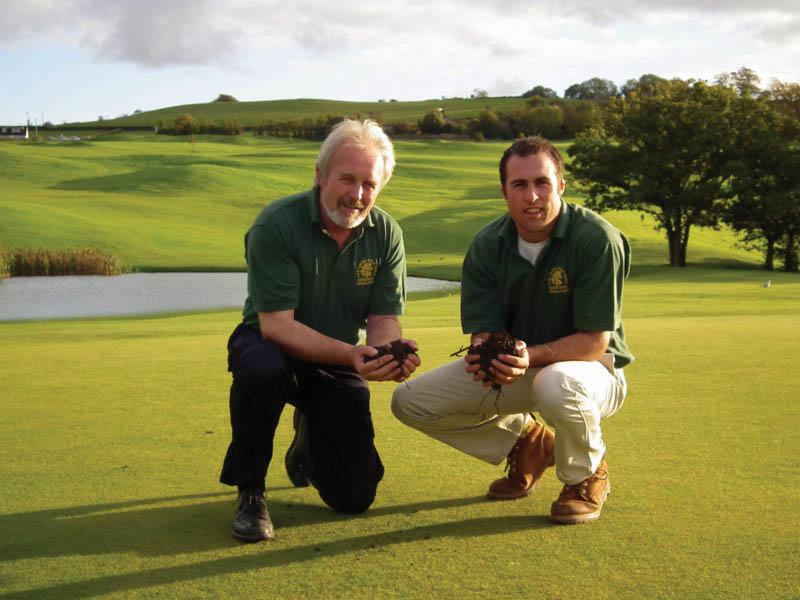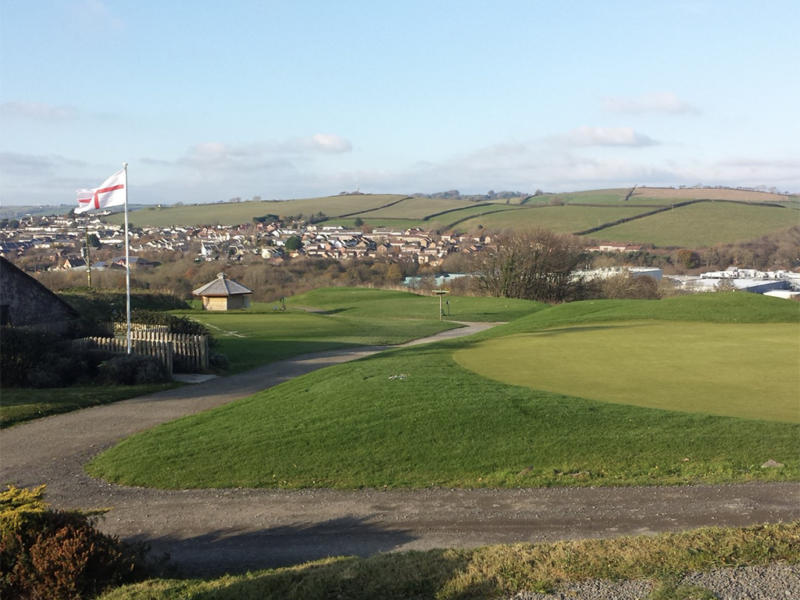- Homepage
- News and Features
- Meet Colin Webber, Vice President in 2019
Meet Colin Webber, Vice President in 2019

Colin pictured in 2011 alongside his son, Josh. Picture used courtesy of Pitchcare
Portmore Course Manager Colin Webber has accepted the Board's nomination to become BIGGA vice president from BTME 2019, and will become president of the association the following year.
We took some time to get to know the former farmer from north Devon, who built a golf course from scratch and became a stalwart of the BIGGA South West and South Wales Region and Devon & Cornwall Section.
“I was a farmer, that’s all I ever wanted to be,” said Colin. “But the hurricane in 1987 flattened all our farm buildings and interest rates at the time were so high it was crippling us. All the cards were stacked against us and we had to find another use for our land.”
Colin and his family realised the potential of building a golf course and over the following six years he visited more than 100 courses alongside his father and uncle, undertaking a huge amount of research.
“The biggest part of the research was when I got myself qualified as a greenkeeper,” Colin explained. “I wasn’t thinking I would actually become one, but I wanted to know what made the difference between a course that was successful and one that struggled.”
Having secured a business loan of just £17,000, construction of a 12-bay driving range began in 1993.
“The only way we could do it was through a phased development,” said Colin. “We were still in a recession and courses were already going bust. Back then you would never see a course for sale, but when I started ringing the big estate agents to find if they had any golf courses, 300 came through. It frightened me to death!
“We learned that location was the biggest thing influencing the success of a course. Then design, layout and the quality of the clubhouse. They would build a prince of a golf course, thinking people will come, but they don’t. People play where their friends are, so we realised that our priority was to build a membership first of all. That’s why we started with a driving range, so we could build an academy.”
Over the following years came another 12 bays, a par-3 9-hole Hawtree-designed course, and then finally a further 18 that set Portmore up as a 27-hole venue.

Portmore Golf Park, picture by @FullerDenis
For a time, Colin was the only greenkeeper operating the site and quickly decided that he wanted to take the site down an ‘organic’ route, restricting the amount of chemicals used on the course.
Colin explained: “I was treating the course the way I had been taught, using pesticides and other chemical products. Here in north Devon we are known for great surf, but then one day there was no surf and 20 guys showed up to play golf.
“They were walking round barefoot and I said ‘be careful, I don’t know if what I’ve sprayed on the turf will be bad for you’. But then I realised that I didn’t know if that was true or not. I had been spraying products and had seen a build-up of algae in the pond and a mountain of thatch in our greens, and I had no idea why.
“By the time we got to 2003 and had started to build the final nine holes, I was certain I didn’t want to go down the chemical fertiliser route. I had so much disease, despite spraying, that I decided to pursue an organic greenkeeping programme.
“We’ve been almost entirely organic for 16 years with no negative effects on the course. I didn’t have any algae in the ponds and the wildlife improved. I didn’t have the time to spray anyway, so the cost savings in time and money were massive. We have gone down that route ever since.”
That commitment paid off and in 2010 Portmore won Overall Achievement of the Year at the Golf Environment Awards.
But it wasn’t all plain sailing; economic problems brought about by the recession that began in 2008 placed incredible strain on the business, and Colin believes that caused a stroke he suffered in 2011.
“The pressure from the bank was unreal,” he explained “They were trying to shut us down and asset strip us.
“The stroke I suffered was horrendous. For a time I lost my eyesight, memory, hearing and speech. But I had no other paralysis, so at first no one realised I had a stroke.
“You lose your confidence, that’s the biggest thing. And the depression that comes with it is horrendous. I was probably as cynical as anyone when it comes to mental health, but that changed me. I have an awful lot of sympathy for those who are going through tough times.”
By investing in the clubhouse, Portmore Golf Park survived the tough economic climate and the income generated by hosting functions and events now outstrips the golf side of the business.
“The business, called Webber Portmore, had been established in 1950 and in the same way the golf course saved it in the early ‘90s, the clubhouse saved the golf course in the ‘10s,” said Colin.
Throughout all this period, Colin had the support of the BIGGA Devon & Cornwall Section, which he was heavily involved within.
“We have a great bunch of guys down here,” he explained. “We can have 70 in a section meeting and there's a huge amount of passion for the industry and the association. In a sense we are all competitors, but we all want to help each other as well. I don’t think it’s changed, it’s a great place to work and long may that continue.”
Each year Colin organises a ‘field trip’ for Devon and Cornwall greenkeepers, visiting an area such as St Andrews, or around London, to learn about greenkeeping practices there.
Colin added: “We learn so much from each other. The education and friendship that we’ve built are great as it means we support each other when we get home. When we get back on the bus there’s a huge debrief of what the guys were doing and the ideas that come bouncing around are just great.
“The challenge for greenkeeping in general is getting people back playing golf again. I believe a lot of that is climate change. The harder it rains, the less people play
“I don’t use any chemicals so I don’t feel the pressure with regards to the withdrawal of products, although I’m well aware that many of my colleagues are really struggling. Here at Portmore we have an army of crows who keep on top of it and they are eating most of the pests. Because they do it every year, the insects aren’t laying eggs any more. It used to be that the damage was unreal. But nature is very good and you just need to give it a chance to restore that balance.”
Colin was first approached about the vice presidency at a very emotional time in his life, with the phone call from BIGGA Chief Executive Jim Croxton to discuss the possibility coming just two weeks after his father, Frank, had passed away on Christmas Day 2017.
“I had a phone call from Jim saying I had been put forward as a potential candidate for the role. Jim didn’t know it, but this was a few weeks after my dad had died so I was very emotional. When he told me that, it had me in floods of tears because the one person I wanted to tell was my dad.
“He had been involved right through this whole journey, I had visited over 100 courses with him and my uncle and we worked together on making the course a success.
“I’m not your traditional greenkeeper, but that said, I have a passion for it, I love it. Sometimes when you start something, you don’t realise where you are going to end up. This is a huge honour and was a massive shock for me.”
Author

Karl Hansell
Karl has been head of communications for BIGGA since March 2016. His duties include editing the monthly Greenkeeper International magazine, in addition to other communications activities for the association.
